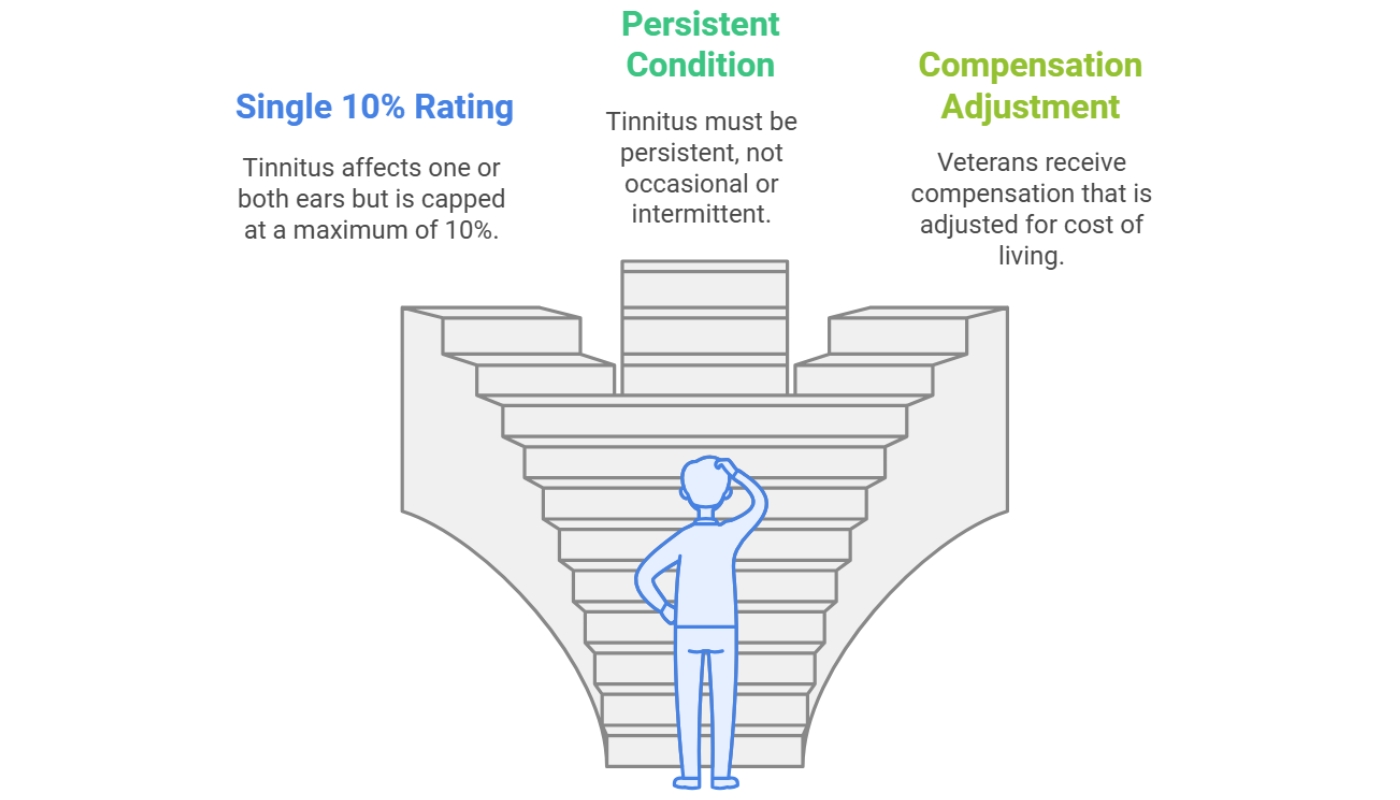Tinnitus is a condition characterized by persistent ringing, buzzing, or hissing in the ears that isn’t caused by external sounds. The condition is especially common among veterans, often stemming from prolonged exposure to loud noises during service.
For many veterans, tinnitus can significantly impact their quality of life, leading to sleep disturbances, anxiety, and difficulty concentrating. This is where tinnitus VA disability benefits come into play.
Securing higher disability rates can not only provide critical financial support but also open doors to healthcare services that can help manage the condition and related issues.
With that in mind, we want to talk about all there is to know about tinnitus VA disability benefits.
Key Takeaway
- Veterans can receive a maximum 10% disability rating for tinnitus, regardless of whether it affects one or both ears.
- To secure benefits, veterans need strong evidence like service records, medical exams, and a nexus letter linking tinnitus to military service.
- While the tinnitus rating is capped, veterans can claim additional compensation for related conditions like anxiety, PTSD, or sleep issues.
- A thorough, well-documented claim improves approval chances; consider seeking help from Veterans Service Organizations.
How are Tinnitus VA Disability Ratings Calculated?

Unlike other conditions that have varying levels of severity ratings, tinnitus is capped at a maximum of 10%, regardless of whether it affects one ear or both.
You can see that the tinnitus VA disability rating system is quite restrictive.
The VA views tinnitus as a single condition, regardless of whether it affects one or both ears. Naturally, veterans must undergo the entire reexamination process again after five years.
- Even if tinnitus affects both ears, veterans can only receive a single 10% rating.
- The rating is only awarded if a veteran can demonstrate that their tinnitus is persistent and not just occasional or intermittent.
- Veterans who qualify for the 10% rating receive a set amount in monthly compensation, which is adjusted periodically for the cost of living.
To secure this rating, veterans must establish a clear service connection. It involves providing evidence that links their tinnitus to noise exposure or incidents experienced during military service.

- Service Records: Documentation that shows exposure to loud noises, such as artillery fire, aircraft engines, or other high-decibel environments.
- Medical Reports: Audiology exams and medical evaluations that confirm the presence of tinnitus and its connection to service-related noise exposure.
- Lay Statements: Personal testimonies or statements from fellow service members who witnessed the noise exposure can strengthen a veteran’s case.
It must be said that VA disabilities are not taxable.
Interesting Fact: Roughly 30% of military veterans are affected by tinnitus, as study by Fed Pract states.
Steps to Increase Your Tinnitus VA Rating
While tinnitus is typically capped at a 10% rating, there are strategic steps veterans can take to potentially increase their benefits by leveraging additional factors.
Here’s a step-by-step guide to help you navigate the process:
| Step | Action | Why It Matters | Key Details | How to Do It |
|---|---|---|---|---|
| 1. Submit an Intent to File | Notify VA of intent to file a claim. | Sets effective date; maximizes back pay. | Submit early for more prep time. | Use eBenefits or VA Form 21-0966 (online, phone, mail). |
| 2. Obtain a Proper Diagnosis | Get a confirmed medical diagnosis. | Essential for claim approval. | Report must confirm tinnitus, severity, and service link. | Visit an experienced audiologist. |
| 3. Choose Claim Type | Decide between FDC or Standard Claim. | Affects processing speed. | Faster if fully prepared; flexible for extra evidence. | Use FDC if ready; Standard if more time needed. |
| 4. Document Daily Impact | Show how tinnitus affects life. | Supports higher ratings via secondary conditions, like GERD. | Track sleep issues, focus, anxiety, etc. | Keep a journal, collect statements, work records. |
| 5. Prepare for C&P Exam | Attend Compensation & Pension exam. | Crucial for claim approval. | Be specific on daily impacts like disrupted sleep. | Be honest, detailed, bring supporting documents. |
| 6. File for Secondary Conditions | Seek compensation for related conditions. | Can increase rating beyond 10%. | Anxiety, migraines, sleep issues. | Provide medical evidence and records. |
Establishing a Service Connection
One of the most critical steps in securing VA disability benefits for tinnitus is establishing a service connection.
It means proving that your tinnitus is directly related to your time in the military. Establishing this link is crucial because, without it, the VA will not approve your disability claim.
The process requires gathering concrete evidence to show that your condition is indeed a result of your service.
Here is how the process goes:
Step 1: Gather Medical Documentation

The cornerstone of any successful VA disability claim is comprehensive medical documentation.
- Audiology reports are specialized hearing tests conducted by audiologists to confirm the presence of tinnitus.
- Service treatment records can provide evidence of ear damage or noise exposure during your service.
- Testimonies from fellow service members or friends who witnessed your noise exposure or the onset of your symptoms can support your claim.
Step 2: Obtain a Nexus Letter
A nexus letter is a formal medical opinion written by a licensed healthcare professional. It explicitly links your tinnitus to your military service.
The nexus letter is often the linchpin of a successful claim, especially if the service records alone do not provide enough evidence.
- The healthcare provider will outline how your exposure to loud noises or traumatic events during service could have caused your tinnitus.
- Even if your service records are incomplete, a well-documented nexus letter from a credible medical professional can fill in the gaps.
Example: A veteran who served in artillery or aviation, where noise exposure is frequent, can benefit significantly from a nexus letter that details how such conditions link to tinnitus.
- A clear statement linking your tinnitus to your military service.
- A detailed explanation of how the medical professional arrived at this conclusion, citing specific evidence from your service and medical records.
- The credentials of the healthcare professional, demonstrate their authority in the field.
Step 3: Leverage Additional Evidence
- If you worked in high-noise environments like aircraft maintenance, construction, or combat zones, document these exposures.
- Certain military jobs are inherently more prone to noise exposure (e.g., artillery crew, pilots, tank operators).
- If you reported symptoms of tinnitus during post-deployment health assessments.

Step 4: Submit a Well-Organized Claim
Once you have gathered all the necessary documentation, it is crucial to submit your claim in an organized and thorough manner.
- Include all supporting documents, such as:
- Audiology reports
- Nexus letters
- Service records
- Lay statements
- Write a detailed statement explaining how your tinnitus is related to your service. Describe your noise exposure and how it has impacted your life.
- Consider seeking help from a Veterans Service Organization (VSO) or a VA-accredited representative to ensure your claim is well-prepared.
Methodology
Compiling this article on tinnitus VA disability benefits involved using a comprehensive and systematic research approach to ensure accuracy and relevance. The process began with a detailed review of official VA guidelines, regulations, and updates on disability ratings, specifically focusing on tinnitus.
To gather the most current information on the rating system, eligibility requirements, and service connection processes, documents from the U.S. Department of Veterans Affairs served as primary sources.
Secondary sources like veteran advocacy websites, research studies on tinnitus prevalence among veterans, and expert opinions from audiologists provided a more nuanced perspective on the challenges veterans face.
The article directly guides veterans through the often complex process of filing a claim, structuring the content to be both informative and actionable. It incorporates real-life examples and practical steps, drawing from veteran testimonies and case studies to highlight effective strategies for increasing ratings.
It emphasizes the crucial role of medical documentation, nexus letters, and the Compensation & Pension (C&P) exam, recognizing these elements as essential in proving a service connection and securing benefits.
Summary
Securing a higher tinnitus VA disability rating can be challenging, but it’s a crucial step toward getting the compensation you deserve. Persistence and preparation are key during the whole process.
Don’t hesitate to seek assistance from professionals who can guide you through the claims process, ensuring you receive the support needed to manage your health and improve your quality of life.
Sources
- HillandPonton – VA Rating for Tinnitus
- US Department of Veteran Affairs – Current Veterans disability compensation rates
- National Library of Medicine – Cognitive Behavioral Therapy for Veterans With Tinnitus
Schmidt CJ, Kerns RD, Finkel S, Michaelides E, Henry JA. Cognitive Behavioral Therapy for Veterans With Tinnitus. Fed Pract. 2018 Aug;35(8):36-46. PMID: 30766380; PMCID: PMC6263445.
- Chisholm Chisholm & Kilpatrick – Getting Veterans (VA) Disability for Tinnitus
- Weebly – Tinnitus and Hearing Survey
- VA Claims Insider – Do I Need a Nexus Letter?
- National Academics Press – Noise and Military Service
- US Department of Veteran Affairs – Get help from a VA accredited representative or VSO
Related Posts:
- VA Disability Rating for PTSD - Criteria and…
- What Determines a GERD VA Disability Rating?
- How to Increase VA Disability Rating for Anxiety Disorders
- VA Disability 5-Year Rule Explained - How It Affects…
- What is the VA DBQ? The Disability Benefits Questionnaire
- Ballistic Stretching - Benefits, Risks, and Best Practices







